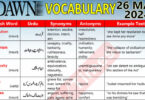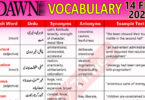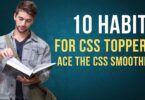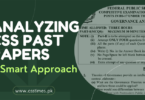“To write is human, to edit is divine.” — Stephen King
Writing is both physical and mental endeavor. Apparently, writing an essay seems to be very difficult. Why writing a paragraph, a mini essay or a full-fledged essay are challenging and grueling task given the fact aspirants to competitive exams are university graduates? Is it due to the complex phenomenon of English as a second language or the problem lies with the very education system and teaching methodologies?
A million dollar question is: Why students join 5-marla academies or a single classroom for acing CSS English essay, in particular, and the rest of the subjects, in general? Based on my practical experience in CSS English classes, majority of students are graduates from well-reputed universities seeking tutorship and teaching desperately. Does it signify that teachers at the level of higher education are either unwilling or incapable of equipping students for the insurmountable future challenges or students due to lack of interest and career counseling miss on important philosophical and practical dynamics of their studies ?
ESSAY writing is a struggle between a writer and a topic.
Keeping in view students’ inherent needs and common difficulties, I have decided to come up with pragmatic, practicable and comprehensive techniques, strategies and plans for acing Essay and Précis papers in a systematic way. They are as follows:
I. Understanding the syllabus and requirements of the Essay and Précis papers
The first and foremost duty of any aspirant is to read the syllabus designed by the FPSC thoroughly and carefully. CSS essay writing is, in terms of syntax and semantics, is fundamentally different from other academic exams. The paper of Précis and Composition comprises grammar, vocabulary, passage, précis, narration ,voices, correction, etc. All these important concepts require methodical and smart strategies to master as they are being taught from the very prep classes.
II. Decoding the salient differences between journalistic and essay writing
Due to extensive reading of newspapers, magazines, research papers and treatise ,aspirants inculcate media, press and journalistic writing norms which are fundamentally different from an academic essay writing requirements. CSS essay writing is based on standardized, formal and correct English rules and regulations. Faced with barrage of questions in CSS English classes and on social media, I have come up with iron-clad, water-tight differences between the two genres of writings.
A. Journalistic writing
1. An advanced, calibrated and up-front ‘executive summary’— a series of discussion
2. Headings and sub-headings
3. Bullet points
4. Focus on the 5-Ws format-‘who, what, where, when and why’
5. All information is delivered in the first paragraph
6. No attempt to summarize
7. No conclusion
Due to immense significance, Essay is dealt in Roman III rather than B.
III. Overall Essay layout as per FPSC/CSS standard: Essay writing Stages: The Writing Process
On the contrary, CSS ESSAY writing is different from journalistic writing altogether .The following differences are enough for understanding.
A. Invention or Pre-writing
1. Understanding the Assignment
2. Setting limits
a. Length
b. Purpose
c. D. Audience
d. Occasion
e. Knowledge
1. Moving from subject to topic
2. Getting started: Free writing
3. Focusing on a topic: Questions for probing
4. Brainstorming
5. Making an informal outline
6. Formulating a thesis
a. Implying a thesis
b. Arriving at a thesis
B. Stage Two: Arrangement
1. Formal outline-Numbering
a. Romans
b. Capital letters
c. English digits
d. Small letters
1. Introduction
a. Stating thesis statement
b. Creating interest
c. Introducing subject
2. Body
a. Unity of thought
b. Cohesion and coherence
c. Well-developed and sufficiently supported
d. Pattern of development-Cause and effect format
3. Conclusion
C. Stage Three: Drafting and Revision
1. Compiling and writing one’s initial draft
2. Carefully revising essay
3. Meticulously revising one’s rough draft
4. Systematically revising the second draft
5. Clinically reviewing the final draft
IV. Selection of relevant materials for mastering and learning the skills and demands of the papers
Most importantly, the papers are set in manners that focus on cognitive and mental aspects of candidates who sit this exam. They study cheap, regurgitated and commonly available stuff which results in lack of clinical and holistic understanding of complex, intricate aspects of style(writing norms) and subjects matter(knowledge base).
V. Understanding key terminologies and writing norms Different forms of discourses in the FPSC essay paper
Note: I will write full articles on Expository, Argumentative, Narrative, Descriptive and Cause and Effect essays separately on the pages of CSS Times.
A. Exposition or Expository for of discourse
1. Forms used in Expository Writing
a. Descriptive/definition
b. Process/sequential
c. Comparative/contrast
d. Cause/effect
e. Problem/solution
f. Classification
2. Major features of exposition
a. Anecdotes
b. Comparisons
c. Quotations
d. Statistics
e. Descriptive details
f. Definitions
g. Charts and graphs(Avoid this in CSS essay)
A. Argumentation
1. Deduction argument(Syllogism-From general to specific)
2. Induction argument (Hypothesis- From specific to general)
3. Evidence and its features
a. Relevant
b. Representative
c. Sufficient
B. Description
1. Types of description
a. Objective description –literal picture of one’s subject
b. Impressionistic/subjective description-personal vision or one’s emotional response
2. Types of descriptive language
a. Objective language – Precise and factual language
b. Descriptive language -Rich and suggestive language –striking phrases or vivid comparisons –Figures of speech
3. Selection of details –Displaying details not telling events
C. Narration
1. Narrative details
2. Narrative variety
3. Narrative order
D. Topic dissection in terms of theoretical and practical aspects
1. Meaning-Literal meaning or strict verbal interpretation
2. Spirit- the real meaning or intention
3. Range- Relevance
4. Direction clarity- a general way in which something is developed; a trend or tendency
5. Organization-Unity of thought
VI. Failure to understand Thesis Statement and Topic Sentence
A. What thesis statement is?
1. Single statement in opening paragraph
2. Writer’s position or explanation
3. Claim and its support
B. What thesis statement is not?
1. A question
2. An announcement
3. A known fact
C. Requirements of thesis statement
1. Purpose
a. Expository
b. Analytical
c. Argumentative
1. Thesis and body support each other
2. Specific and clear language
D. What is topic sentence
1. The first(usually) sentence in a paragraph
2. Mini-thesis for the paragraph
3. Provide a sketch of the essay’s argument
4. Introduce the topic of the paragraph
5. Most important sentence in a paragraph/ a focus sentence
6. Identify the main idea and point of the paragraph
7. Supporting details in the
8. Not be too general or too specific
VII. Understanding linguistic technicalities and sensitivities
These are the most essential building blocks of a sentence. They bring about heightened impact, persuasion, effectiveness and rhetorical gracefulness. Due to lack of systematic studies and internalization of their implementation in rigorous writing sessions, they render essay writing uninteresting, patchy and unconvincing. The following aspects of stylistic spectrum should be mastered in true letter and spirit.
A. Grammar
1. Parts of speech
2. Tenses
3. Sentences and types
4. Punctuations
5. Narration and voices
6. Sentence Correction
B. Vocabulary
Vocabulary tends to be currency of communication .Poor, offensive and collocationally-misplaced vocabulary is considered one of the major causes of failure, says the FPSC reports. Diction, sugar-coated words and idiomatic items embellish one’s writing resulting in uniqueness and dynamism .The following aspects must be improved from all angles.
1. GRE words
2. Idioms
3. Pair of words
4. Proverbs
5. Analogy
6. One word substitutions
7. Synonyms and antonyms
8. Phrasal verbs
9. Phrases
10. Grouping of Words
VIII. Grueling, continued and systematic writing practice
A. Daily paragraph writing
First of all, understanding paragraph writing is important. My strategy in classes is I make my students write 40 paragraphs,10 on introduction,10 on body and 10 on conclusion. At a later stage,10 paragraphs are written in a fashion that encompass introduction, body and conclusion. When students master the art of paragraph writing, they feel at ease to start writing small,mini essays successfully.
B. Mini essay writing
Mini essays serve as an important link between paragraph and full-fledged essay. Due to inadequate knowledge and inherent fear of writing correct English, students consider full essay writing a herculean task. To make it easy, it’s better to write mini essays comprising 5,6 or 7 pages.
C. Full-fledged essay writing
After mastering the art of paragraph and mini essay writhing, students take the challenge of professional and prolific essay writing head-on. They deem writing as an interesting activity rather than boring and complex phenomenon.
D. Practicing comprehension reading
According to Hari S. Truman, “if you cannot convince them, confuse them. This is pertinent when it comes to reading. Comprehension passage warrants thorough understanding and errors-free language. The most important strategy is to practice any solved samples and compare them with each other.
E. Practicing précis writing
This is the most important pillar of academic writing.It is better to understand its principles and practice as many passages as possible.
IX. Getting your writings checked by CSS English expert or any person having understanding of writing norms
“To write is human, to edit is divine.” — Stephen King
According to experts of creative writing ,to write 10 pages it is required to read 500 pages( a bit exaggeration).Writing is an evolutionary process and calls for continued reading and proper checking, evaluation and assessment from English language experts. Getting scripts checked pave the way for prolific and professional language skills.
X. Major errors committed in essay writing
Now I am going to first bifurcate errors in two broad sections and then put them in general categorization for complete understanding. Some errors are forgivable while others are unforgivable. Errors are bound to happen, but their magnitude and occurrence should not blur the chances of getting at least pass marks. Blunders are to be avoided.
A. Semantics/Content Mistakes/Knowledge base/Subject matter
1. Materials and contents do not match the topic
2. Flawed, wrong structure
3. An absence of thesis statement
B. Syntax/Style of writing/Stylistic Issues
1. Habitually using repetitive words and expressions
2. Failure to differentiate between informal or too formal writing
3. Unprofessional and improper sentence structure
C. General categorization of errors
1. Spelling mistakes
2. Subject-verb agreement
3. Punctuations misuse
4. Run-on sentences
5. Sentence fragments
6. Wordiness
7. Squinting modifiers
8. Adjective/adverb confusion
9. Pronoun Confusion
10. Double negative
11. Dangling construction
12. Sequences of tense
13. Mechanical error with a quotation
14. Small and capital letters
15. Faulty sentence structure
16. Sentence Sprawl
17. Split Infinitives
These errors need to be rectified and should be avoided in writing.
XI. Four golden rules for acing the FPSC essay paper
A. Answering and understanding the topic holistically
B. Using one’s own words
C. Supporting statement with evidence
D. Observing word limit
XII. Self-evaluation and self-assessment once the task of writing an essay is finished
A. Thesis statement
1. Make sure the following requirement are fulfilled
a. Clear and specific
b. Thesis signposts the direction your essay follows
c. Thesis is consistent with the body of
d. essay
e. Ideas and information do not digress from the original direction and range
B. Body Paragraphs
1. Unified
2. Coherent
3. Well developed
4. Particular pattern of development
5. Facts or examples or smoother transitions
6. All the points support your thesis
C. Introduction and conclusion
1. They reinforce your thesis in their entirety
D. Sentences
1. Effective
2. Interesting
3. Varied in length and
4. Structure
E. Words
1. Accurately express your ideas
Note:When all the above-mentioned requirements are fulfilled,it is guaranteed you have written cogent and telling piece of writing.
XIII. Suggested readings
- Grammar in Use by Raymond Murphy
- Practical English Usage by Michael Swan
- Exploring the World of English by S.Saddat
- Wren and Martin (HSEG&C)
- Good Essay Writing by Peter Redman
- 600+Common Mistakes T.J.Fitikides(Common Mistakes in English)
- Authentic books and extensive readings
Tailpiece: This piece of writing is dedicated to my parents who stand by be me through thick and thin despite many challenges. The only thing they say to me is: Move on, forget about the colorful past and architect your own destiny. Hands off great mom!








[…] Check Also: CSS Essay | War on Terrorism is Contributing towards Growing Abuse of Human Rights […]
[…] Read Also: CSS Essay Writing and Acing Strategies (By: Saeed Wazir) […]
Thanks 🙏